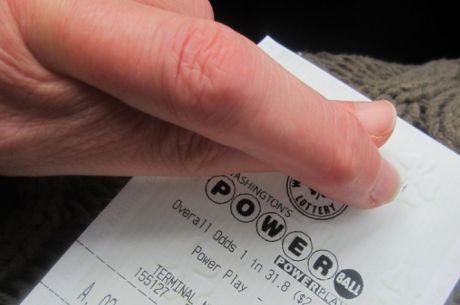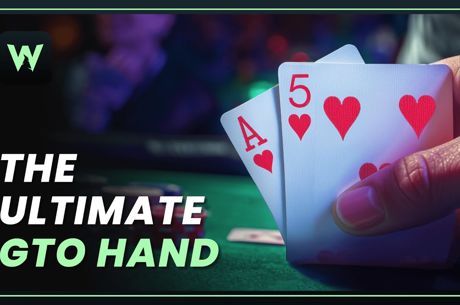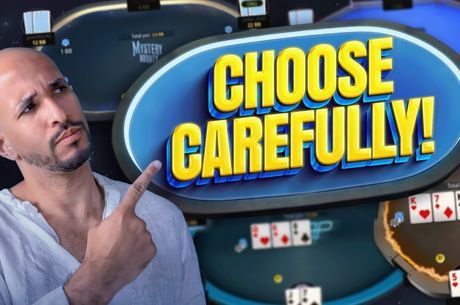Rebel Without a Hand: Playing “Chicken” With the All-In Bluff

There is much to be learned about poker from studying other games. Many writers have expounded on poker enlightenment from comparisons with chess, rock-paper-scissors, roulette, martial-arts matches, and so on.
One game that has perhaps has not been considered enough for what it reveals about poker is the game of “Chicken.” Two contestants drive directly at each other at high speed on a narrow, isolated road. The first one to lose his nerve and turn away to avoid a collision is declared the chicken, and loses whatever was at stake.
The American movie-watching public was first introduced to Chicken in the classic film Rebel Without a Cause (1955), though it was a variation that involved driving toward the edge of a cliff. Thereafter, the game became a cliché in 1950s and 1960s films about teenagers gone bad. Chicken had something of a movie revival some 30 years ago, with a playful scene in Footloose oddly involving slow-moving tractors, and a deadly serious one in The Hunt for Red October using submarines.
What does this have to do with poker? Well, let me remind you of a great televised hand of poker played between Phil Ivey and Paul Jackson at the 2005 Monte Carlo Millions.
Bluff, Re-Bluff, Re-Re-Bluff, Re-Re-Re-Bluff… All In!
Briefly, Ivey and Jackson are heads-up for the title. Ivey has a substantial chip lead. He raises preflop with Q♥8♥. Jackson calls with 6♠5♦. The flop is 7♣J♣J♥. Both players have nothing, but a war of aggression breaks out: Ivey bets, Jackson raises, Ivey raises, Jackson raises, and for the amazing fourth raise, Ivey goes all in, finally prompting Jackson to fold. All the while, the commentators keep saying of each man in turn that he surely has to give up here, he obviously can’t continue at this point — and they’re wrong over and over again.
It’s worth watching, or rewatching:
This is Poker Chicken at its finest. In fact, when talking about the hand many years later to PokerNews, Jackson actually describes himself as feeling “like a scared rabbit in headlights.”
“Chicken” and Games of Partial Information
It has often been observed that there is a way to guarantee victory at Chicken — remove your steering wheel so that you cannot lose your nerve at the last second and turn aside.
But a moment’s thought will reveal that this is not enough. If your opponent doesn’t know that the steering wheel has been removed, he may continue to plow ahead in the erroneous belief that you will turn chicken. So the second crucial element of the strategy is to be sure that your opponent knows that your steering wheel has been removed, by, for example, waving it ostentatiously out the window as the two cars approach each other. The other driver will realize that you cannot swerve, and therefore the only way he can avoid a collision is to swerve himself, losing the game.
This was the all-important piece of the strategy that was missing in Stanley Kubrick’s Cold War satire, Dr. Strangelove or: How I Learned to Stop Worrying and Love the Bomb.
In the film, American planes have been ordered to drop their nuclear bombs on the Soviet Union and cannot be called back. The Soviet ambassador informs the U.S. president that they have recently made operational a “doomsday device,” which upon sensing a nuclear strike will detonate bombs that release lethal radiation clouds that will encircle the globe, destroying all of humanity. Attempting to disarm or circumvent this device will also result in its detonation.
The president’s science advisor, Dr. Strangelove, says, “Deterrence is the art of producing in the mind of the enemy the fear to attack. And so, because of the automated and irrevocable decision-making process which rules out human meddling, the Doomsday Machine is terrifying and simple to understand — and completely credible and convincing…. Of course, the whole point of a Doomsday Machine is lost if you keep it a secret! Why didn't you tell the world, eh?”
In a poker raising war, you may be privately willing to commit all of your chips when you put in an ordinary raise, but your opponent can’t know that. He may continue to believe that he can get you to fold with another aggressive raise. In Chicken terms, you may have removed the steering wheel, but your opponent doesn’t realize it. Saying “all in,” however, is the poker equivalent of waving the steering wheel out the window.
Of course, the analogy breaks down when one or both players actually want the confrontation to escalate to all in, whereas Chicken is based on the assumption that a collision is disastrous for both participants. To make the analogy better, we’d have to imagine a version of Chicken in which some cars are secretly much stronger and better able to survive the crash than others. Some, akin to having the stone cold nuts, would actually be indestructible, though this would not be obvious to an opponent in advance of the collision — a Sherman tank hiding under the skin of a Yugo, so to speak.
The Psychology of “Chicken” (Who Has the Most to Lose?)
A less extreme but very real variation on Chicken plays out daily in Mexico (and probably lots of other countries, too), as I learned this week. I’m reading an interesting book by Tom Vanderbilt, Traffic: Why We Drive the Way We Do (and What It Says About Us). It’s a lengthy explanation of and reflection on the research that has been done about the psychological and sociological aspects of driving.
Vanderbilt says that one “common bane of driving” in Mexico is the large number of unmarked, uncontrolled intersections: “Who will go, who will yield — it is an intricate social ballet with rough, vague guidelines.”
One of the key factors is eye contact, explains Vanderbilt. “Look at another driver and he will know that you have seen him, and thus dart ahead of you. Not looking at a driver shifts the burden of responsibility to him (assuming he has actually seen you), which allows you to proceed first — if, that is, he truly believes you are not aware of him.”
This dangerous game is complicated by other considerations, such as whose car is most valuable, and thus which driver has the most to lose if he guesses incorrectly about the other driver’s intention.
The person who has the greatest advantage in these common confrontations may be the one who is driving an old beater and who assiduously, conspicuously avoids looking to either side as he barrels through the intersection. Like a Chicken driver waving his steering wheel, he is irreversibly committed to his course of action, and wants to be sure that commitment is known to others. He is like the poker player who announces himself all in, and can no longer be either bluffed or pressured into folding.
He Who Hesitates Is Lost
When both players are convinced they have the best of it, it makes little difference who is first to cry “all in,” as the chips will end up in the pot no matter how it plays out. But when both players are bluffing, as with the Ivey-Jackson hand, all of the power resides with the one who is first to declare all in. The obvious danger, however, is that you have an opponent who is not bluffing, and will be happy to run his tank over your VW Beetle.
Ivey had two key pieces of information about the strength of Jackson’s hand. First, Jackson did not reraise preflop. Second, Jackson did raise on the flop. The latter is of particular importance, as it would be an unlikely move for a player who had a monster hand like a third jack or 7x7x. A player in Jackson’s position might well call Ivey down with just a seven, or with a medium pocket pair. But such hands would effectively be bluff-catchers against Ivey having a jack or a larger pocket pair, as he well might with his preflop raise. They would be precarious holdings with which to counterattack aggressively.
I think that consideration led Ivey to the conclusion that Jackson was bluffing. In case he were wrong, he had three backup safeties. First, if Jackson had either a seven or a smaller pocket pair, Ivey could hit his queen or eight to make a bigger two pair. Second, he might catch a backdoor flush. And third, he had a roughly 4-to-1 chip lead, so he would still be ahead in the match even if he doubled Jackson up.
The much more interesting question is whether Jackson could have won the pot by beating Ivey to the all-in move — particularly if he had just smooth-called the flop, and waited until the turn or river to make his power play. Alas, we’ll never know.
Conclusion
Next time you’re playing no-limit poker, and the situation seems right to commit all your chips as either a bluff or a value bet, feel free to imagine yourself speeding down a deserted country road. You stare down your onrushing opponent, and toss your steering wheel out the window with a flourish.
Robert Woolley lives in Asheville, NC. He spent several years in Las Vegas and chronicled his life in poker on the “” blog.
Want to stay atop all the latest in the poker world? If so, make sure to get PokerNews updates on your social media outlets. on Twitter and find us on both and !









